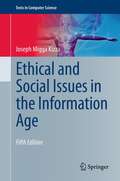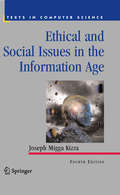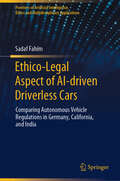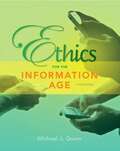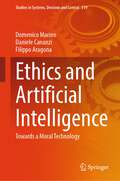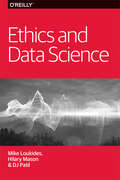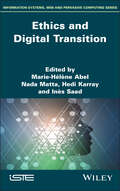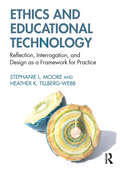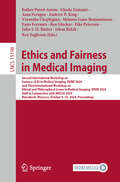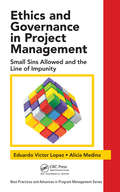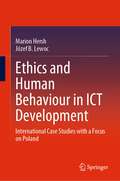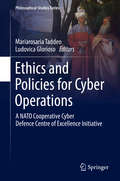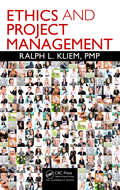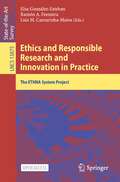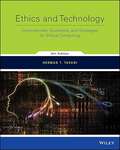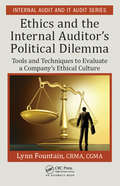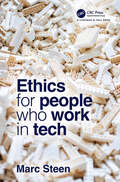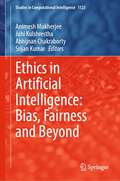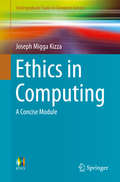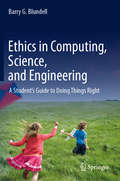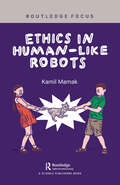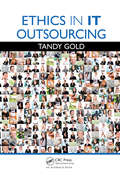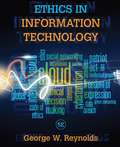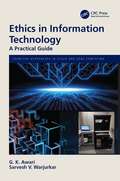- Table View
- List View
Ethical and Social Issues in the Information Age (Texts in Computer Science)
by Joseph Migga KizzaThis new edition examines the ethical, social, and policy challenges stemming from computing and telecommunication technology, and mobile information-enabling devices. Features: establishes a philosophical framework and analytical tools for discussing moral theories and problems in ethical relativism; offers pertinent discussions on privacy, surveillance, employee monitoring, biometrics, civil liberties, harassment, the digital divide, and discrimination; examines the new ethical, cultural and economic realities of computer social networks; reviews issues of property rights, responsibility and accountability relating to IT and software; discusses how virtualization technology informs ethical behavior; introduces the frontiers of ethics in VR, AI, and the Internet; surveys the social, moral and ethical value systems in mobile telecommunications; explores the evolution of electronic crime, network security, and computer forensics; provides exercises, objectives, and issues for discussion in every chapter.
Ethical and Social Issues in the Information Age, 4th Edition
by Joseph Migga KizzaThe frequency of new editions of this book is indicative of the rapid and tremendous changes in the fields of computer and information sciences. First published in 1995, the book has rapidly gone through three editions already and now we are in the fourth. Over this period, we have become more dependent on computer and telecommunication technology than ever before and computer technology has become ubiquitous. Since I started writing on social computing, I have been advocating a time when we, as individuals and as nations, will become totally dependent on computing technology. That time is almost on us. Evidence of this is embodied in the rapid convergence of telecommunication, broadcasting, and computing devices; the miniaturization of these devices; and the ever increasing storage capacity , speed of computation, and ease of use. These qualities have been a big pulling force sucking in millions of new users every day, sometimes even those unwilling. Other appealing features of these devices are the increasing number of applications, apps, as they are increasingly becoming known, and being wireless and easily portable. Whether small or big, these new gizmos have become the centerpiece of an individual’s social and economic activities and the main access point for all information. Individuals aside, computing technology has also become the engine that drives the nations’ strategic and security infrastructures that control power grids, gas and oil storage facilities, transportation, and all forms of national communication, including emergency services.
Ethical and Social Issues in the Information Age, 5th Edition
by Joseph Migga KizzaThis new edition examines the ethical, social, and policy challenges stemming from computing and telecommunication technology, and mobile information-enabling devices. Features: establishes a philosophical framework and analytical tools for discussing moral theories and problems in ethical relativism; offers pertinent discussions on privacy, surveillance, employee monitoring, biometrics, civil liberties, harassment, the digital divide, and discrimination; examines the new ethical, cultural and economic realities of computer social networks; reviews issues of property rights, responsibility and accountability relating to IT and software; discusses how virtualization technology informs ethical behavior; introduces the frontiers of ethics in VR, AI, and the Internet; surveys the social, moral and ethical value systems in mobile telecommunications; explores the evolution of electronic crime, network security, and computer forensics; provides exercises, objectives, and issues for discussion in every chapter.
Ethico-Legal Aspect of AI-driven Driverless Cars: Comparing Autonomous Vehicle Regulations in Germany, California, and India (Frontiers of Artificial Intelligence, Ethics and Multidisciplinary Applications)
by Sadaf FahimThis book is a comparative study of the laws and regulations involving legal and ethical issues related to Artificial Intelligence (AI), in particular for self-driving cars or autonomous vehicles (AVs). It identifies, analyzes, and points out such issues via a study of laws and regulations in India, Germany, and California, determining the legal liabilities of designer, developer/programmer, manufacturer, producer, users, or AI in the case of AVs. AV technology is being touted as one that is poised to bring revolution in the mobility ecosystem by lessening the number of accidents and by providing other benefits, such as potential to reduce traffic, increase safety and mobility, lower energy usage and generate free time. Despite having such a potential to shape and transform the future, and involvement of tech-giants like Google, Amazon, Facebook, and Microsoft, regulations around AI and AVs are still on the drawing board stage in many countries, as they grapple on how to address this issue which has both local and global players involved and affects both local and global populace. The book studies and compares the existing and evolving regulations in three different regions to bring out the lacunae, loopholes and best practices. It highlights when AI deserves legal personhood, and when it requires to be granted legal standing. It also points out the civil and criminal legal liabilities arising when AV is involved in an accident, and the ethical issues involved in the deployment of AI. The book goes beyond new regulations to analyze whether challenges and problems arising from AI technology can be addressed within existing civil and criminal laws - procedural and substantive law – or whether a sui generis law on AI technology is required. The analysis and the results showcased here would be highly useful for multi-disciplinary research on the topic. Regulators of both industry and governance would find the contents invaluable in getting a broader picture of the issues and concerns around this topic, along with policy makers would be able to come up with more effective regulations on AI and AVs.
Ethics For The Information Age
by Michael J. QuinnThis book is appropriate for any standalone “computers and society” or “computer ethics” course offered by a computer science, business, or philosophy department, as well as special "modules" in any advanced CS course. In an era where information technology changes constantly, a thoughtful response to these rapid changes requires a basic understanding of IT history, an awareness of current issues, and a familiarity with ethics. Ethics for the Information Age is unique in its balanced coverage of ethical theories used to analyze problems encountered by computer professionals in today’s environment. By presenting provocative issues such as social networking, government surveillance, and intellectual property from all points of view, this market-leading text challenges students to think critically and draw their own conclusions, which ultimately prepares them to become responsible, ethical users of future technologies.
Ethics and Artificial Intelligence: Towards a Moral Technology (Studies in Systems, Decision and Control #519)
by Domenico Marino Daniele Cananzi Filippo AragonaIt is a book made up of questions, some without certain answers, that attempts to open the reader's mind to new and, perhaps, futuristic scenarios. There are two diametrically opposed approaches to artificial intelligence today. On the one hand, there are the techno-pessimists who see only dystopian scenarios and experience technological progress with apprehension, emphasising the dangers, and on the other hand, there are the techno-optimists who, on the other hand, tend to overestimate the positive effects, going so far as to attribute almost thaumaturgic virtues to technological progress. Our approach is meant to be secular and scientific; the risks must not be concealed, nor must they be overestimated, just as the positive aspects must not be emphasised. And, in any case, as in any social phenomenon, the governance of processes and the definition of a system of rules and policies are the aspects that can create advantages or disadvantages and, above all, can determine who are the beneficiaries of the advantages and who have to bear the disadvantages. Like any new technology, this too can be dehumanising, but technology is a tool that depends on how it is used and by whom it is used. that of ethics is, therefore, a fundamental aspect. Therefore, one should neither be a techno-optimist nor a techno-pessimist, but should be aware that governing the economic and social structural changes that the advent of artificial intelligence will cause will be crucial to ensure prosperity for future generations and to avoid negative and even apocalyptic scenarios. So no futurist dystopias! Humanity has so far always been able to govern technological progress, it certainly has the potential to govern what some have called 'the Final Invention', but it will only succeed if it is able to understand the peculiarities of this new process of technological development and give it ethical content.The book provides a thoughtful review of the relationship between artificial intelligenceand ethics, approaching the issue from different perspectives: philosophical, technological, economic and legal. This will be one of the most important issues that Humanity will have to face and resolve.
Ethics and Data Science
by Mike Loukides Dj Patil Hilary MasonAs the impact of data science continues to grow on society there is an increased need to discuss how data is appropriately used and how to address misuse. Yet, ethical principles for working with data have been available for decades. The real issue today is how to put those principles into action. With this report, authors Mike Loukides, Hilary Mason, and DJ Patil examine practical ways for making ethical data standards part of your work every day.To help you consider all of possible ramifications of your work on data projects, this report includes:A sample checklist that you can adapt for your own proceduresFive framing guidelines (the Five C’s) for building data products: consent, clarity, consistency, control, and consequencesSuggestions for building ethics into your data-driven cultureNow is the time to invest in a deliberate practice of data ethics, for better products, better teams, and better outcomes. Get a copy of this report and learn what it takes to do good data science today.
Ethics and Digital Transition (ISTE Invoiced)
by Nada Matta Inès Saad Hedi Karray Marie-Hélène AbelThis book presents a study carried out by the IEEE-SMC French chapter on ethics and digital transformation in industry and society. Based on a survey of researchers in ICT, artificial intelligence (AI), as well as on presentation seminars, this study examines the various aspects that should be considered when assessing ethical principles in approaches to digital transition, particularly with regard to intelligent systems. Considering this, Ethics and Digital Transition presents the main technologies and uses of intelligent systems. Bringing together specialists from various fields, it explores the different dimensions of ethics that should be considered in the development of these systems, from the engineering sciences to law, sociology and philosophy. It also looks at the future challenges of ethics in the digital transition.
Ethics and Educational Technology: Reflection, Interrogation, and Design as a Framework for Practice
by Stephanie L. Moore Heather K. Tillberg-WebbEthics and Educational Technology explores the creation and implementation of learning technologies through an applied ethical lens. The success of digital tools and platforms in today’s multi-faceted learning and performance contexts is dependent not only on effective design and pedagogical principles but, further, on an awareness of these technologies’ interactions with and implications for users and social systems. This first-of-its-kind book provides an evidence-based, process-oriented model for ethics in technology-driven instructional design and development, one that necessitates intentional reflective practice, a critical and theoretically informed interrogation of technology, and a participatory approach to technology design and applications. Rich with real-world ethics examples and design cases, supported by reflection questions and applied activities, and attentive to ethical codes among preeminent educational technology organizations, this is an ideal resource for students, faculty, researchers, and professionals across educational technology, instructional design, learning sciences, learning engineering, organizational training, and other disciplines.
Ethics and Fairness in Medical Imaging: Second International Workshop on Fairness of AI in Medical Imaging, FAIMI 2024, and Third International Workshop on Ethical and Philosophical Issues in Medical Imaging, EPIMI 2024, Held in Conjunction with MICCAI 2024, Marrakesh, Morocco, October 6–10, 2024, Proceedings (Lecture Notes in Computer Science #15198)
by Aasa Feragen Ben Glocker Veronika Cheplygina Enzo Ferrante Islem Rekik Ghada Zamzmi John S. H. Baxter Roy Eagleson Esther Puyol-Antón Andrew P. King Melanie Ganz-Benjaminsen Eike PetersenThis book constitutes the refereed proceedings of the Second International Workshop, FAIMI 2024, and the Third International Workshop, EPIMI 2024, held in conjunction with MICCAI 2024, Marrakesh, Morocco, in October 2024. The 17 full papers presented in this book were carefully reviewed and selected from 21 submissions. FAIMI aimed to raise awareness about potential fairness issues in machine learning within the context of biomedical image analysis. The instance of EPIMI concentrates on topics surrounding open science, taking a critical lens on the subject.
Ethics and Governance in Project Management: Small Sins Allowed and the Line of Impunity (Best Practices in Portfolio, Program, and Project Management #26)
by Eduardo Victor Lopez Alicia MedinaThis book shows executive, project, program, and portfolio managers how ethical behavior can ensure that an organization has proper governance. Improper governance and unethical behavior have led to such well-known financial disasters as Enron and Madoff Investments. The book arms managers with two important tools: Small Sins Allowed (SSA) and Line of Impunity (LoI), which together can be the foundation for renewed and vigorous corporate governance. SSA is a powerful tool that helps managers establish a level above which adherence to ethical standards is expected. LoI aids managers in identifying ethical fault lines that may exist in a company and helps to keep unethical behavior in check.
Ethics and Human Behaviour in ICT Development: International Case Studies with a Focus on Poland
by Marion Hersh Józef B. LewocEthics and Human Behaviour in ICT Development discusses ethics in a professional context and encourages readers to self-assessment of their own behaviour. It provides thought-provoking accounts of the little-known early history of technological development in information and communication technology (ICT) and the automation industry in Poland, with a focus on Wroclaw. The book provides a framework for understanding the relationship between ethics and behaviour, and analyses critically ethical and behavioural issues in challenging workplaces and social contexts. It includes:case studies from around the world, especially Poland, which illustrate the relationships between human behaviour and ethics;biographies of successful Polish ICT and automation leading designers;analysis of case studies of human behaviour and ethics in challenging industrial development and other environments; andillustrative practical applications alongside the theory of human behaviour and ethics. The authors demonstrate the ingenuity of the early Polish designers, programmers and other specialists in overcoming the shortage of components caused by import embargoes to enable Poland to develop its own computer industry. An example of this is Elwro, formerly the largest manufacturer of computers in Poland. The discussion of its growth illustrates the potential of human creativity to overcome problems. The discussion of its fall highlights the importance of ethical approaches to technology transfer and the dangers of a colonialist mentality. The book is designed for engineers, computer scientists, researchers and professionals alike, as well as being of interest for those broadly concerned with ethics and human behaviour.
Ethics and Policies for Cyber Operations
by Mariarosaria Taddeo Ludovica GloriosoThis book presents 12 essays that focus on the analysis of the problems prompted by cyber operations (COs). It clarifies and discusses the ethical and regulatory problems raised by the deployment of cyber capabilities by a state's army to inflict disruption or damage to an adversary's targets in or through cyberspace. Written by world-leading philosophers, ethicists, policy-makers, and law and military experts, the essays cover such topics as the conceptual novelty of COs and the ethical problems that this engenders; the applicability of existing conceptual and regulatory frameworks to COs deployed in case of conflicts; the definition of deterrence strategies involving COs; and the analysis of models to foster cooperation in managing cyber crises. Each essay is an invited contribution or a revised version of a paper originally presented at the workshop on Ethics and Policies for Cyber Warfare, organized by the NATO Cooperative Cyber Defence Centre of Excellence in collaboration with the University of Oxford. The volume endorses a multi-disciplinary approach, as such it offers a comprehensive overview of the ethical, legal, and policy problems posed by COs and of the different approaches and methods that can be used to solve them. It will appeal to a wide readership, including ethicists, philosophers, military experts, strategy planners, and law- and policy-makers.
Ethics and Project Management
by PMP, Ralph KliemEthics plays a critical role in project management, but all too often, its importance is overlooked. This benign neglect can result in serious consequences to individuals and organizations, ranging from tarnished reputations to civil and criminal liability. Ethics and Project Management demonstrates the importance of making ethics a key considerati
Ethics and Responsible Research and Innovation in Practice: The ETHNA System Project (Lecture Notes in Computer Science #13875)
by Luis M. Camarinha-Matos Ramón A. Feenstra Elsa González-EstebanThis Open Access book aims to present practical contributions to the ethics governance framework, the conceptualization and characteristics of ethics tools, as well as the experience gained from their application in different institutions.Its main objective is to provide a practical and useful guide that will help other institutions to start introducing Research Ethics effectively in their organizations. The European initiative ETHNA System has designed an ethics governance framework that can be implemented following specific guidelines and tools that can help different types of institutions to promote and generate responsible research and innovation.The papers included in this book were organized in topical sections as follows: foundations; experiences and lessons learned; ethics tools in practice; and looking into the future: main challenges.
Ethics and Technology: Controversies, Questions, and Strategies for Ethical Computing
by Herman T. TavaniEthics and Technology, 5th Edition, by Herman Tavani introduces students to issues and controversies that comprise the relatively new field of cyberethics. This text examines a wide range of cyberethics issues - from specific issues of moral responsibility that directly affect computer and information technology (IT) professionals to broader social and ethical concerns that affect each of us in our day-to-day lives. The 5th edition shows how modern day controversies created by emerging technologies can be analyzed from the perspective of standard ethical concepts and theories.
Ethics and the Internal Auditor's Political Dilemma: Tools and Techniques to Evaluate a Company's Ethical Culture (Security, Audit and Leadership Series #10)
by Lynn FountainThis book helps auditors understand the reality of performing the internal audit role and the importance of properly managing ethical standards. It provides many examples of ethical conflicts and proposes alternative actions for the internal auditor. Internal auditors are well-schooled on the IIA Standards, but the reality is that the pressure placed on internal auditors related to execution of work and upholding ethical standards can be very difficult. Regardless of best practice or theory, auditors must be personally prepared to manage through issues they run across.
Ethics for People Who Work in Tech
by Marc SteenThis book is for people who work in the tech industry—computer and data scientists, software developers and engineers, designers, and people in business, marketing or management roles. It is also for people who are involved in the procurement and deployment of advanced applications, algorithms, and AI systems, and in policy making. Together, they create the digital products, services, and systems that shape our societies and daily lives. The book’s aim is to empower people to take responsibility, to ‘upgrade’ their skills for ethical reflection, inquiry, and deliberation. It introduces ethics in an accessible manner with practical examples, outlines of different ethical traditions, and practice-oriented methods. Additional online resources are available at: ethicsforpeoplewhoworkintech.com.
Ethics in Artificial Intelligence: Bias, Fairness and Beyond (Studies in Computational Intelligence #1123)
by Animesh Mukherjee Juhi Kulshrestha Abhijnan Chakraborty Srijan KumarThis book is a collection of chapters in the newly developing area of ethics in artificial intelligence. The book comprises chapters written by leading experts in this area which makes it a one of its kind collections. Some key features of the book are its unique combination of chapters on both theoretical and practical aspects of integrating ethics into artificial intelligence. The book touches upon all the important concepts in this area including bias, discrimination, fairness, and interpretability. Integral components can be broadly divided into two segments – the first segment includes empirical identification of biases, discrimination, and the ethical concerns thereof in impact assessment, advertising and personalization, computational social science, and information retrieval. The second segment includes operationalizing the notions of fairness, identifying the importance of fairness in allocation, clustering and time series problems, and applications of fairness in software testing/debugging and in multi stakeholder platforms. This segment ends with a chapter on interpretability of machine learning models which is another very important and emerging topic in this area.
Ethics in Computing
by Joseph Migga KizzaThistextbook raises thought-provoking questions regarding our rapidly-evolvingcomputing technologies, highlighting the need for a strong ethical framework inour computer science education. Ethicsin Computing offers a concise introduction to this topic, distilled fromthe more expansive Ethical and SocialIssues in the Information Age. Features: introduces the philosophical framework for analyzingcomputer ethics; describes the impact of computer technology on issues ofsecurity, privacy and anonymity; examinesintellectual property rights in the context of computing; discusses suchissues as the digital divide, employee monitoring in the workplace, and healthrisks; reviews the history ofcomputer crimes and the threat of cyberbullying;provides coverage of the ethics of AI, virtualization technologies, virtualreality, and the Internet; considers the social, moral and ethical challengesarising from social networks and mobile communication technologies; includesdiscussion questions and exercises.
Ethics in Computing, Science, and Engineering: A Student’s Guide to Doing Things Right
by Barry G. BlundellThis comprehensive textbook introduces students to the wide-ranging responsibilities of computing, science and engineering professionals by laying strong transdisciplinary foundations and by highlighting ethical issues that may arise during their careers. The work is well illustrated, and makes extensive use of both activities, and ethical dilemmas which are designed to stimulate reader engagement. A number of memorable case studies are also included and frequently draw on the demanding aerospace industry. The book adopts a strongly human centric approach, with matters such as privacy erosion and censorship being viewed not only in their current context but also in terms of their ongoing evolution. What are our individual ethical responsibilities for ensuring that we do not develop for future generations a technological leviathan with the potential to create a dystopian world? A broad range of technologies and techniques are introduced and are examined within an ethical framework. These include biometrics, surveillance systems (including facial recognition), radio frequency identification devices, drone technologies, the Internet of Things, and robotic systems. The application and potential societal ramifications of such systems are examined in some detail and this is intended to support the reader in gaining a clear insight into our current direction of travel. Importantly, the author asks whether we can afford to allow ongoing developments to be primarily driven by market forces, or whether a more cautious approach is needed. Further chapters examine the benefits that are associated with ethical leadership, environmental issues relating to the technology product lifecycle (from inception to e-waste), ethical considerations in research (including medical experimentation involving both humans and animals), and the need to develop educational programs which will better prepare students for the needs of a much more fluid employment landscape. The final chapter introduces a structured approach to ethical issue resolution, providing a valuable, long-term source of reference. In addition it emphasises the ethical responsibilities of the professional, and considers issues that can arise when we endeavour to effect ethically sound change within organisations. Examples are provided which highlight the possible ramifications of exercising ethical valour. The author has thus created an extensively referenced textbook that catalyses student interest, is internationally relevant, and which is multicultural in both its scope and outlook.
Ethics in Human-like Robots
by Kamil MamakThe idea of creating artificial humans can be found at the beginning of the human culture. Ancient myths contain the stories of artificial humans brought to life by gods. The word robot originates from a play that was about artificial humans made from artificial flesh that aims to serve real humans. With advancements in robotics, the materialization of this idea is more real than ever before. We are witnessing attempts to create humanoid robots that might be deployed in many spheres of our life - policing, healthcare, and even for love and sex.The book focuses on the ethical issues of human likeness of robots and human tendency to anthropomorphize. It is built on the assumption that design choices are not neutral, and they need to be discussed to align robots with human values. With robots operating in the physical world, they bring ideas and risks that should be addressed before widespread deployment. The book reviews specific issues and provides suggestions and recommendations for improving robots to serve humans better. It draws on literature from Human-Robot Interactions, ethics of AI and robotics, and the philosophy of technology.
Ethics in IT Outsourcing (Applied Software Engineering Series)
by Tandy GoldIn IT divisions and organizations, the need to execute in a competitive and complex technical environment while demonstrating personal integrity can be a significant personal and organizational challenge. Supplying concrete guidelines for those at an ethical crossroads, Ethics in IT Outsourcing explores the complex challenges of aligning IT outsour
Ethics in Information Technology (Fifth Edition)
by George ReynoldsGain a strong understanding of the legal, ethical, and societal implications of information technology with Reynolds' ETHICS IN INFORMATION TECHNOLOGY, Fifth Edition. The latest edition of this dynamic text provides up-to-date, thorough coverage of notable technology developments and their impact on business today. You will examine issues surrounding professional codes of ethics, file sharing, infringement of intellectual property, security risk assessment, Internet crime, identity theft, employee surveillance, privacy, compliance, social networking, and the ethics of IT corporations. This book offers an excellent foundation in ethical decision-making for current and future business managers and IT professionals. Unlike typical introductory Information Systems books that cover ethical issues only briefly, ETHICS IN INFORMATION TECHNOLOGY provides thorough coverage to prepare the individuals responsible for addressing ethical issues in today's workplace. You will learn how to examine ethical situations that typically arise in IT and gain practical advice for addressing the relevant issues. Up-to-the-minute business vignettes and thought-provoking questions challenge your knowledge, while features focused on decision-making--including updated Manager's Checklists--provide brief, critical points to consider in making key business decisions. Trust ETHICS IN INFORMATION TECHNOLOGY, Fifth Edition, to equip you with the understanding of IT and ethics needed for confident decision-making and professional success.
Ethics in Information Technology: A Practical Guide (Cognitive Approaches in Cloud and Edge Computing.)
by G. K. Awari Sarvesh V. WarjurkarThis reference text introduces concepts of computer and Internet crime, ethics in information technology, and privacy techniques. It comprehensively covers important topics including ethical consideration in decision making, security attacks, identification of theft, strategies for consumer profiling, types of intellectual property rights, issues related to intellectual property, process and product quality, software quality assurance techniques, elements of an ethical organization, telemedicine, and electronic health records. This book will serve as a useful text for senior undergraduate and graduate students in interdisciplinary areas including computer science, information technology, electronics and communications engineering, and electrical engineering.
